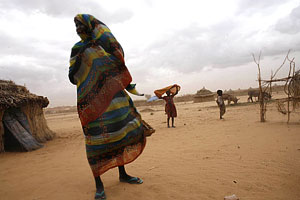By Dr. Rowan Gillies, International Council President of Doctors Without Borders/Médecins Sans Frontières (MSF)
"I returned to Darfur this October, having worked there in July 2004 when few aid agencies were operational and there was a crisis requiring a massive and urgent increase in assistance. Fighting was going on then but it was possible to rapidly expand the aid effort. Today things are very different," writes Dr. Rowan Gillies, Doctors Without Borders/Médecins Sans Frontières (MSF) International Council President, on the situation in Darfur, Sudan.

As storm clouds descend, young children stand with their family's donkeys on the edge of Rwanda Camp. Photo © Jehad Nga |
Dr. Gillies recently returned from a visit to Khartoum and Sudan's Darfur region. Here he writes about the current situation.
Doctors Without Borders/Médecins Sans Frontières (MSF), one of the main health service providers in the Darfur region of Sudan over the past thirty months, has now drastically reduced its medical-humanitarian activities because it has become too dangerous for our own staff to work in some areas. We have completely withdrawn from a number, including Korma, North Darfur and Kutrum in the Djebel Mara — a particularly difficult departure given an outbreak of cholera, a disease that demands urgent treatment to prevent death. We have reduced activities in many other parts of Darfur because of a number of targeted security incidents against aid workers. In the last three months, 12 aid workers have been killed and dozens more have been assaulted, beaten and harassed. MSF alone has had over forty serious security incidents since the beginning of the year.
|
The medical indicators from MSF programs in the 'islands of assistance' we are still able to work in do not describe the 'medical crisis' that we faced in 2004. Mortality rates and nutritional parameters are in fact within 'acceptable' limits. Aid has done its basic, life-saving job. When it comes to the condition of people in the camps, the crisis is not one displayed by measurable data, but of human suffering. People are stuck in these camps in an environment that is becoming increasingly politicised and violent. They have no idea if or when they will have a future; are unable to move outside the camps to collect the basic necessities of life for fear of rape or death, and are under attack and threat from Sudanese government forces and rebel militias. This is the fate of those who have the dubious luck of being confined in the 'open prisons' that are the displaced camps of Darfur.

In the "Rwanda" displaced persons camp in Tawilla, a woman and her children stand in front of their hut as a sandstorm approaches. Photo © Jehad Nga |
The deteriorating security situation, for which the Sudanese government and militias on all sides have ultimate responsibility, is only intensified by the continued interventionist posturing of the UN Security Council. Many countries of the West — the United States, Great Britain, France, the European Union, along with the African Union, the leadership of the United Nations and many Western advocacy groups demand the deployment of UN 'peacekeeping' troops, as the best way to assist the suffering population, while recognizing privately that an effective intervention is unlikely.
For political leaders to engage in such duplicitous discourse is one thing, it is another that humanitarian actors such as Jan Egeland, the UN Deputy Secretary General for Humanitarian Affairs, publicly support such a campaign. Maintaining neutrality is critical for humanitarian workers to be able to assist in such a war zone. Taking sides in this way can have dangerous effects on all aid actors.
More important, the current international strategy has failed to stem the resumption of violence against civilians. Instead it has assisted Khartoum and its militias in their anti-Western rhetoric and attacks, escalating a dangerous situation into a near-impossible one and contributing to the reduction of vital aid operations.
This observation in no way exonerates Khartoum from its ultimate responsibility for attacks that occur in government areas, nor the other warring parties from their primary responsibilities — to ensure that the lives of non-combatants are respected and that humanitarian agencies can provide impartial assistance to the victims of the conflict.
MSF has not expressed an opinion on the benefits or otherwise of military or political actions, and their contribution towards a 'lasting solution'. What we can see, though, is the effect they are having on our ability to keep people alive.
At this, we cannot remain silent, and demand that those responsible for the violence, and those applying pressure, externally make it possible for humanitarian assistance to continue. As it is, the way that pressure is being applied risks sacrificing the very civilians it is ostensibly designed to protect.
Dr. Rowan Gillies
International Council President
Doctors Without Borders/Médecins Sans Frontières (MSF)





